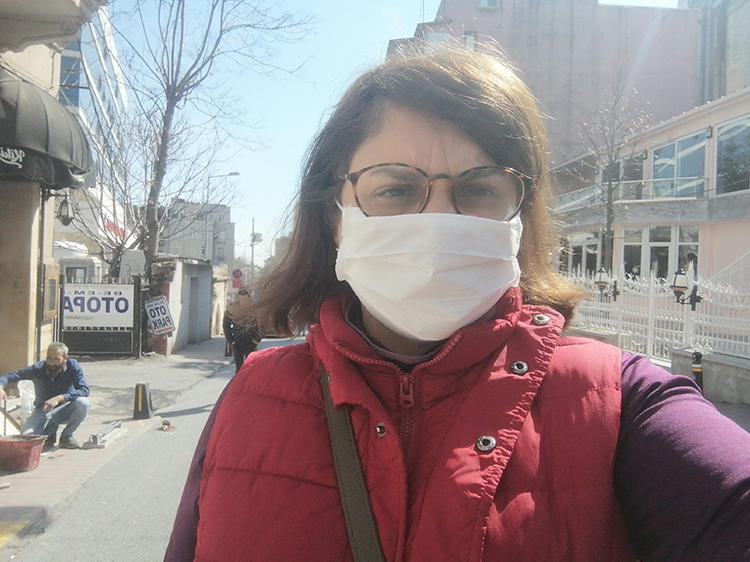Journalist Evrim Kepenek works in Istanbul as the women and LGBTI+ news editor for the independent news website Bianet. Like most people, she works from home these days, but she is also a street reporter who recently observed twin fears among the Turkish public: getting infected with COVID-19 and getting arrested for talking about it.
Turkey has taken hundreds of people into police custody for “provocative” social media posts about the pandemic, as stated by Interior Minister Süleyman Soylu on March 25. Government media watchdog RTÜK fined three TV channels due to their reporting on the coronavirus, according to news reports, and police have either taken into custody or summoned for questioning at least eight journalists about their coronavirus stories or tweets in March, CPJ has found.
CPJ spoke to Kepenek about her work during the pandemic.
What type of precautions did you take to keep yourself safe while working?
I carried a small bottle of disinfectant. Also, I used a mask. Besides that, I was careful about my social distancing. I did not use public transport. I tried to not go to the places that I would have to use it. Now we work from home, which keeps us relatively safer.
What are the greatest difficulties and worries of reporting in the field at a time of pandemic?
The worry in the faces of everyone in the street is so notable. Personally, I was most affected by homeless elderly and children. They did not like the idea very much when I wanted to write a story on them.
I was close to the Taksim First Aid Hospital [but] I could not go in. Everybody was so tense. Frankly, I was hesitant to enter. I wandered through the pharmacies on that street all day, for 4-5 hours. Most of the people did not want to talk. This stance is not about the coronavirus. People do not jump on the idea of talking to a microphone as they used to. Everybody is very afraid. For example, I am interviewing someone; think of a quick Q&A. Somebody passing by says “they will take you in” to the one talking to me. Such fear is common and this is not about COVID-19. Even if COVID-19 would be out of our lives one day, this fear won’t leave our news sources and ‘the man in the street.’
I believe this [self]censorship is about people who speak their minds on social media being taken into custody for the flimsiest things. As a result, I see sources unwilling to talk, worry in people’s faces and unhelpful civil servants (medical workers, doctors, police) when I go out to the streets.
How well are the Turkish authorities doing in terms of transparency and the accessibility of information in this time of crisis?
I read about examples of different countries on social media. The cities that the patients are in, their ages, genders; every kind of information is shared. One could think that there is no pandemic in this country if you look at the way our way ministers speak.
There is no transparency, there is no information, there are no precautions; instead, there are people who have to leave the house to go to work and political prisoners who are left to die. These are very troubling matters but social awareness on these issues can only be raised on social media these days. A government taking advantage of the people not being able to go in the streets is quite worrisome for me.
I try to pull through by thinking that we can answer such problems and irresponsibility by [doing] our job only. Dozens of our colleagues are in prisons and dozens have to offer their signature at police stations regularly every week. Practicing journalism in this country has always been hard. If you ask me how harder does COVID-19 make it, I would say not as hard as police violence and insults.
Do you feel pressured to self-censor when informing the public, or have you observed it?
Nobody wants to speak their mind; people do not want to be profiled or blacklisted. The journalists are afraid. I am afraid too, obviously. I cannot be myself if I cannot express myself through journalism. I am not a poet to write about the troubles of this country’s children. I am not a painter to tell about the murders of women and male violence. I am trying to express myself through the news, same as hundreds of other colleagues.
CPJ researcher Hakkı Özdal contributed to this report.
